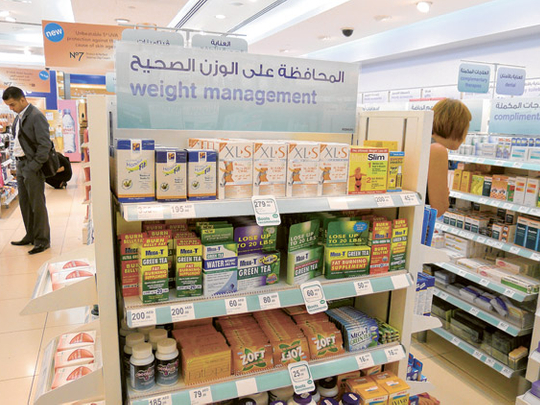
Dubai: As obesity remains a health concern, the market for weight loss supplements or diet pills remains strong in the UAE.
"Despite the economic crisis across the globe, the weight management market is still accelerating as the core targets of this market are the consumers for whom health and beauty is of higher importance than the cost. Such impulsive consumers are driving the growth of the market," Dr Safeek Ali, a dietician at Welcare Hospital, told Gulf News.
"The market players are therefore formulating attractive advertisements and brand promotions to gear up their product revenues amongst the numerous other alternatives and substitutes that are available in the market."
Big names
The two biggest players in the UAE weight-loss pills market were Xenical, produced by Swiss giants Roche, and Reductil, made by the US's Abbott Laboratories.
At the beginning of this year, Reductil was recalled from the shelves of 300 licensed pharmacies across the emirates due to risks they carried of increasing the chance of heart attack and stroke.
Following this, the US Food and Drug Administration (FDA) launched a campaign against weight-loss products that contained certain prescription drugs and chemicals, many of which were being sold as dietary supplements.
They issued warnings about more than 70 products found to contain undeclared chemicals. According to pharmacists, Xenical is the only chemical product on the market.
"Diet pills are not recommended by doctors. By taking them you can contract a lot of other diseases. A lot of products have been recalled," B.R. Shetty, managing director of the New Medical Group, told Gulf News.
Following these recalls, a number of herbal or natural supplements are on the market.
Vitavision is a Dubai company that imports dietary supplements from the US.
"In the past three years, demand has increased by at least 200 per cent and it is still growing," said Sunil Ramchandani, chief executive of Vitavision, in a previous Gulf News interview.
"Three years ago we only had three nutrition shops and now we have 85."
Any large pharmacy stocks a wide selection of herbal dietary supplements. Hassan Zaidan, physician and purchasing manager at Bin Sina Pharmacy cited XLS, Hoodia Fit and Smart Diet as popular choices.
How they work
He said: "Diet modulators work on the brain and give it a false positive feedback that the stomach is full."
"Some will act as a fat burner," he said.
"We advise that they shouldn't be used for a long period of time and should be followed up with a physician."
According to Kishore K., manager of retail for Life Pharmacy, green tea was the most popular.
Other popular health supplements includes chromium, which helps to maintain healthy sugar levels, acai berries, which help increase metabolism, and hoodia, a South American fruit traditionally taken in the morning when the men went hunting so they would not feel hungry through the day.
"There are lots of alternative medicines which fall into the classification of natural and nutrient supplement and help boost metabolism. People are certainly looking for a herbal remedy. Obesity levels are increasing and people are becoming more aware. These are mostly for people who work a lot," said Kishore K.
According to recent national statistics, more than 60 per cent of Emiratis are overweight.
The World Health Organisation estimates that more than 25 per cent of men and almost 40 per cent of women aged over 15 in the UAE are obese.
Health experts have put it down to diet, lifestyle and education.
Zaidan said that demand for weight loss supplements also peaked during certain times of the year, for example just after Ramadan.











